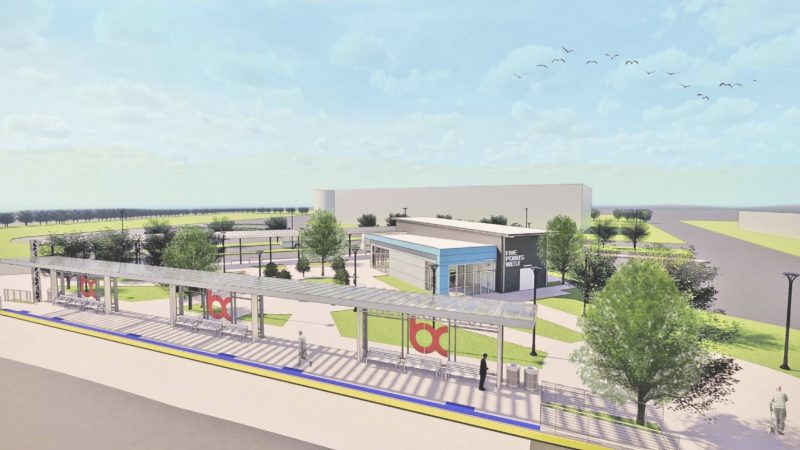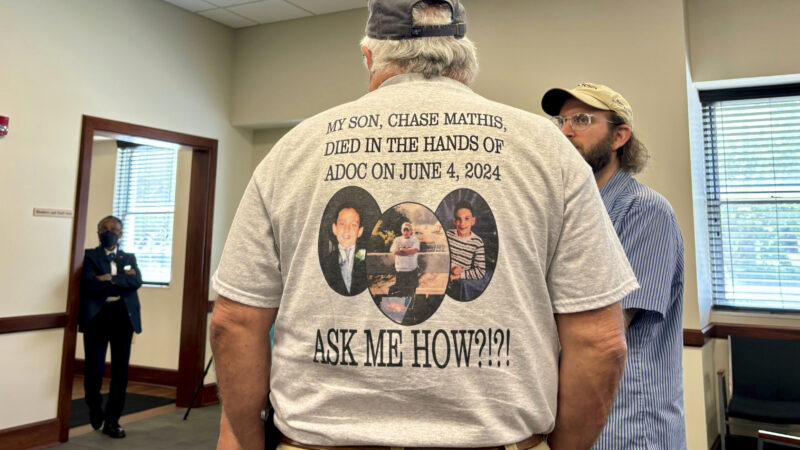Birmingham Council Set To Fund Rapid Transit Project Next Week
The Birmingham City Council is set to allocate $18 million of the city’s American Rescue Plan funding toward the construction of the city’s Bus Rapid Transit system.
The project, which will create a 10-mile, higher-speed public transit corridor through 25 neighborhoods, broke ground in December. But rising construction costs due to the COVID-19 pandemic had placed significant strain on the project, according to Charlotte Shaw, the city’s deputy director of capital projects, at the council meeting on Tuesday.
“This is what’s called ’the perfect storm’ right now for the construction industry,” Shaw said. “Material and supplies and workforce [costs] have escalated tremendously.”
That meant that when the city sent out a request for contractors to bid on the project, the lowest bid it received was still $11 million higher than the $45.8 million budgeted for the project. When the city called for bids a second time, it received none.
Shaw said city planners had worked to lower the project’s costs, cutting significant portions, such as a $1.1 million transit signal priority component, which would streamline traffic signal patterns along the corridor of the bus rapid transit. Even with these reductions and factoring in contingency costs, Shaw said the project would need an additional $14 million in funding to move forward.
But councilors argued that they’d rather not make any cuts to the Bus Rapid Transit program at all.
“I think it’s important that we don’t spend all of this money to create just another bus service,” District 2 Councilor Hunter Williams said. “We need to be really intentional about making sure this is actually a Bus Rapid Transit service … Initially, because of the constraints, Mrs. Shaw took out the $1.1 million for traffic lights, which is the ‘rapid’ part of the BRT. I think it’s important that we keep that in. I think it’d be really foolish to spend almost $60 million and not do the project correctly over $1.1 million … The real backbone of BRT in any city is its ability to be on time, consistent and reliable.”
District 8 Councilor Steven Hoyt went even further, arguing that the council should fund the BRT project “in its entirety.”
“This really says much about who we are as a city and if we do what we say we’re going to do,” Hoyt said. “We need to make sure that we do it and we do it right … I really don’t think we need to take anything out that we’ve had planned for this project … When other projects hit snags, we don’t tell them to scale back. We find the money.”
An obvious source, some councilors suggested, was federal American Rescue Plan funding. The city had its first $74 million tranche of relief money in May; another $74 million will follow next May. Though some of that first half already has been allocated to city employees’ premium pay, there’s roughly $53.1 million still to be spent.
A proposal to allocate $18 million to the BRT program will come before the council for a vote next Tuesday. That money will initially come from the city’s general fund balance, which will be replenished by ARP funding later. Though that last point was the subject of some debate, the council eventually voted unanimously to advance the proposal out of committee.
Last month, the council had balked at Mayor Randall Woodfin’s proposed divvying of the remaining ARP funding into several different “buckets” — including, among other categories, $18.75 million for public transportation. Councilors — particularly Williams and Hoyt — had taken issue with that line item, arguing that there had been no specific explanation from Woodfin’s office on how that transit allocation would be spent.
Now, it appears, they have it.
Alabama prison chief responds to families’ criticism
The department said that a number of changes have been made since Corrections Commissioner John Q. Hamm was appointed in 2022. The department said hiring has increased, and there are ongoing efforts to curb the flow of contraband and improve communications with families.
40 years after ‘Purple Rain,’ Prince’s band remembers how the movie came together
Before social media, the film Purple Rain gave audiences a peak into Prince’s musical life. Band members say the true genesis of the title song was much less combative than the version presented in the film.
Park Fire in California could continue growing exponentially, Cal Fire officer says
Cal Fire has confirmed that over a hundred structures have been damaged in the Park Fire, which grew overnight near Chico, Calif. Difficult firefighting conditions are forecast through Friday night.
Checking in with Black voters in Georgia about the election, now that Biden is out
Some voters who could be key to deciding who wins Georgia. What do they think about Vice President Harris becoming the frontrunner in the race to be the Democratic nominee?
Tahiti’s waves are a matter of ‘life and death’ for surfing Olympics
Tahiti's Teahupo'o wave has a slew of riders for the Paris 2024 Olympics. NPR finds out why it's called one of the most dangerous waves.
Researchers are revising botanical names to address troubling connotations
Since the mid-1700s, researchers have classified life with scientific names. But some of them have problematic histories and connotations. The botanical community is trying to tackle this issue.




